
Are you interested in a brighter, whiter smile? At Cochell Family Dentistry, we want all our patients to achieve outstanding whitening results. We offer three different types of teeth whitening and will be happy to discuss which option is right for you. Don’t wait any longer! Let our cosmetic dentist give your smile what it deserves - teeth whitening in Salem, OR. Call our dental office today to schedule an appointment!
If you think that cup of coffee you drank this morning or each puff of that cigarette isn’t leaving a mark on your teeth, guess again. Our teeth, gums, tongue, and entire mouth come into contact with everything we ingest. Over time, various substances can leave a stain on your teeth.
To get a better idea of what can cause these stains and discoloration to develop, here is a short list:
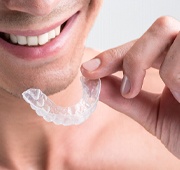
Depending on the type of product you use, whitening works one of two ways: bleaching or abrasion. Bleaching, because of the active ingredient, either carbamide peroxide or hydrogen peroxide, removes deep and surface stains. Non-bleaching products such as whitening toothpaste, require physical action to remove surface stains. The mild abrasion is what removes much of the external stains.
At Cochell Family Dentistry, we offer three forms of teeth whitening for our patients, each providing outstanding results:
When opting for in-office treatment, you’re probably hoping to get rid of some of the more stubborn and intrinsic stains. By using whitening bleaching agents, carbamide peroxide or hydrogen peroxide, they can penetrate the enamel’s surface, breaking down the stained molecules. Within a short amount of time, you’ll begin to see the enamel change shades, giving you a more beautiful, brighter smile.
In-office teeth whitening offers great benefits, including:
Using Opalescence take-home teeth whitening kits, you can brighten your smile in the comfort of your own home! During your consultation with Dr. Christel Cochell, she will take impressions of your teeth, which will be used to make customized whitening trays for your teeth. Once finished, you’ll return to our dental office and she will deliver your trays, along with a tutorial on how to use the high-grade bleaching gel at home.
It’s important that you follow the dentist’s instructions in regard to how long you should wear your trays each day in order to achieve successful results. If worn properly, you will begin to see results within a few days!
By choosing the Opalescence take-home teeth whitening kit, you:
If you are new to whitening and want to see the results that you can expect with a less expensive option, the good news is that at Cochell Family Dentistry, we can supply you with Opalescence Go-UltraFit (one size trays) or sheer whitening strips that are similar to products found in store, only with a higher concentration of bleaching gel!
What does that mean? It means that these whitening strips are effective at removing surface stains caused by coffee, wine, tobacco, and more.
In addition to the many of the benefits found in a take-home whitening kit, Opalescence Go trays and Sheer White strips:

Now that you better understand the types of teeth whitening we offer, you may be asking, “How much does it cost?” At Cochell Family Dentistry, we understand that since dental insurance companies are unlikely to pay, you may feel apprehensive about moving forward with treatment. However, there is good news. Keep reading to find out how we determine the cost of your care as well as what we can offer to help keep your out-of-pocket expenses lower.
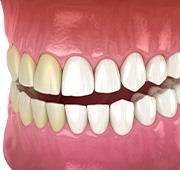
To establish how much your professional teeth whitening treatment will cost, we will need to meet with you for a scheduled consultation. Generally, there is a set price for the service itself; however, the price can vary based on how many treatments you will need. We will determine this by:
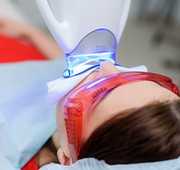
At Cochell Family Dentistry, we offer both in-office and take-home whitening solutions; however, it’s often helpful to see the price points for different types of treatment. While you will find that store-bought varieties are considerably cheaper, it’s important to remember that a less expensive method of whitening is not always the best.
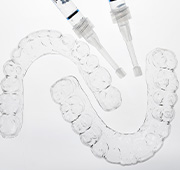
Professional whitening can seem like a costly investment if you only look at the price points listed above; however, when you think about the time and attention that goes into making sure your teeth remain safe while improving their aesthetics, it’s worth every penny.
The quality and of work you can expect with professional teeth whitening is far superior to anything you might buy over the counter. Not only can it generate results much faster than store-bought solutions, but it’s a much safer alternative. Gels, strips, and even whitening pens may remove some surface stains, but they cannot reach those that exist beneath the surface. Also, without proper oversight, you could harm your teeth over time.
When choosing a whitening solution, it’s best to think about how fast you want to see results as opposed to how much money you can save.

Since professional teeth whitening is a cosmetic procedure, most dental insurance companies will not cover the cost. This means that you will need to either pay out of pocket for treatment or inquire about alternative payment options. At Cochell Family Dentistry, we are pleased to provide flexible financing through CareCredit.
As a third-party company that offers multiple payment plans for individuals to choose from, there are no surprise fees, and you can choose which plan works best with your timeline and budget. Instead of being forced to pay the entire amount upfront, you can pay it off over time in a more convenient and budget-friendly way.
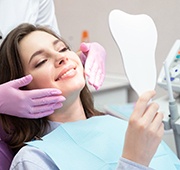
Whitening your teeth can be an exciting process, especially if you’re tired of living with a stained, discolored, smile. At Cochell Family Dentistry, we are pleased to offer our patients multiple options, each designed to produce beautiful, long-lasting results. But with any type of cosmetic dentistry solution, we understand you may have a few questions about teeth whitening, which is why you will find the following list of common questions asked by our patients. If you do not see yours listed below, please feel free to contact us to schedule an appointment.
When looking at the structure of a tooth, you will discover that the enamel protects the visible portion above the gum line (the crown). Protecting its root is the cementum, and underneath both layers is what is referred to as dentin, which contains many nerve endings. Because this inner layer is less dense, it can often become more sensitive should it lose its protective covering (enamel or cementum).
When stains develop inside the tooth, the peroxide used within the whitening agent permeates these layers to blast away stains; however, it can also reach the dentin layer, which can cause some minor irritation and sensitivity to the nerves within your tooth. This feeling should only be temporary and dissipate within a short period of time.
To determine if you are a candidate for teeth whitening, you will need to schedule a consultation with Dr. Christel. Once she reviews your teeth and goes over your oral and overall health history, you will learn if this or another cosmetic solution will help you achieve your desired results. You should understand, however, that not all patients are eligible for teeth whitening.
Those with customized restorations like dental crowns, veneers, or dental fillings cannot expect the hydrogen or carbamide peroxide used to change the shade. The reason is that these artificial teeth are not porous like tooth enamel, so the gel will not permeate the outer layers or change the color of your teeth.
In most cases, no, discolored teeth cannot be attributed to genetics; however, there are instances where an individual may have what is known as Dentinogenesis imperfecta or Amelogenesis imperfecta, which can cause teeth to appear discolored and weak. Because it is unlikely for most people to have one of these rare genetic mutations, a majority of dentists treat discoloration because of poor lifestyle habits. The most common reasons for stains or discolored teeth are typically caused by:
This is not to say that you cannot see results when using an over-the-counter whitening treatment, but the reality is that the bleaching gel used in many of the products only addresses stains located on the outer layers of the teeth. Also, they do not offer the same professional strength as those used in a dental office. The reason for this is that the Food and Drug Administration (FDA) regulates the whitening solutions (peroxide) used in over-the-counter products; however, dental professionals are allowed to use higher concentrations of hydrogen peroxide or carbamide peroxide that safely and effectively treat intrinsic and extrinsic stains.
Because the gels used in over-the-counter whitening strips and trays are less powerful, you may find that your results do not appear until you’ve been using the product for several months. This practice can cause additional harm to your teeth because you do not have a dentist overseeing the process. Gum irritation caused by inappropriate application of the gel and excessive whitening that leads to tooth sensitivity are serious concerns that often come with store-bought solutions.
When choosing to see a professional to whiten your teeth, there is a chance your results can last 2-3 years. However, this can vary from patient to patient based on the commitment to oral hygiene and the decision to forgo bad lifestyle habits. Because a dentist’s concentration of hydrogen peroxide or carbamide peroxide is much stronger and capable of producing brighter shades in less time, you can expect your whiter smile to last longer but only if you work to maintain it. Practicing good oral habits at home (i.e., brushing, flossing, and rinsing) as well as giving up smoking, tobacco use, nail-biting, and limiting exposure to dark-colored foods and beverages (i.e., those that contain tannins) can prolong your results and prevent more frequent touch-ups by a cosmetic dentist.